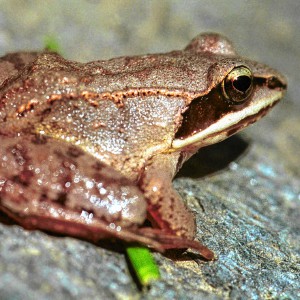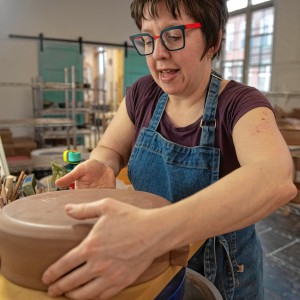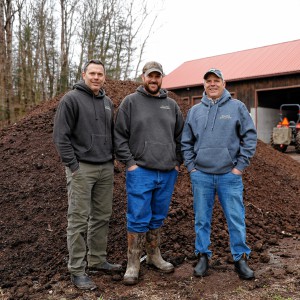Book Bag: ‘Lost Places’ by Sarah Pinsker; ‘These Trees Tell a Story’ by Noah Charney
| Published: 05-18-2023 3:51 PM |
Lost Places
By Sarah Pinsker
Small Beer Press
Fantasy and science fiction writer Sarah Pinsker has won a number of honors, including Nebula, Hugo, and Philip K. Dick awards, and her writing has been called “wildly original and, frankly, jaw-dropping,” as one critic puts it.
“Lost Places,” published by Small Beer Press in Easthampton, pulls together 12 stories by Pinsker, including some of her more celebrated and longer stories, such as “Two Truths and a Lie,” with some of her less well-known tales, and one new story. It’s the second Pinsker collection Small Beer has released.
What ties many of the stories together is Pinsker’s exploration of disturbing trends in the world today, such as the rise of AI and surveillance technology, and the ways in which technology in general threatens human connections.
Pinsker, who lives in Maryland, also uses different voices and approaches in her work — not surprisingly, because she’s a singer-songwriter, too.
There are plenty of eerie tales in the new collection. In “Science Facts!” campers return from a hike to find they’ve been gone for years and have long been considered missing. And remember how a former U.S. president claimed he could shoot someone on New York’s 5th Avenue and not lose any supporters? In “A Better Way of Saying,” an actor on a movie set does just that and gets away with it.
Article continues after...
Yesterday's Most Read Articles
 Treehouse, Big Brothers Big Sisters turn race schedule snafu into positive
Treehouse, Big Brothers Big Sisters turn race schedule snafu into positive
 Northampton man will go to trial on first-degree murder charge after plea agreement talks break down
Northampton man will go to trial on first-degree murder charge after plea agreement talks break down
 Area property deed transfers, April 25
Area property deed transfers, April 25
 Contentious dispute ends as Hampshire Regional schools, union settle on contract
Contentious dispute ends as Hampshire Regional schools, union settle on contract
 South Hadley’s Lauren Marjanski signs National Letter of Intent to play soccer at Siena College
South Hadley’s Lauren Marjanski signs National Letter of Intent to play soccer at Siena College
 Primo Restaurant & Pizzeria in South Deerfield under new ownership
Primo Restaurant & Pizzeria in South Deerfield under new ownership
“That Our Flag Was Still There” takes the hyperpartisan political divide and strains of authoritarianism in America today to the next level. In the country’s new iteration, “free speech” is permitted only at designated times and areas, robot police patrol the National Mall in Washington, D.C., and people enter a lottery to win a coveted spot as a living U.S. flag for one day — and some die in the process.
But that’s considered a great honor in a country where newscasts are devoted to the daily list of “Top Patriots.” The narrator of the story, Lexi, preps these lottery winners to become a living flag, for which they wear special suits, are injected with dye to simulate the flag’s colors, and then are drugged to feel blissful as they’re raised on a platform and filmed live on TV.
Lexi’s pretty content with her work, feeling that she’s doing her patriotic duty. But her co-worker, Maggie, can’t forget what happened to her grandson, who was attacked for questioning the government curfew: “Beaten bloody for pointing out the truth because he said it outside the designated place and time, and the ones who attacked him got their names up in lights.”
But “Lost Places” also offers some stories of hope and empowerment. In “Everything is Closed Today,” schools, businesses, movie theaters, and public buildings in an unnamed town are shuttered because of threats and violence elsewhere, including a bomb set off at a baseball stadium in California.
The story’s main character, a library assistant named Mae, is worried about how she and her partner, Dana, will pay their bills now that Mae can’t work. Internet and phone service is spotty, and “officials” are telling everyone to shelter in place, even if it’s not clear how widespread the various threats are or who’s behind them. It’s all just… weird.
“It was a twilight zone of a week,” Mae relates. “Perfect sunny days, quiet streets, no work but nothing open.”
In part to have something to do, Mae starts teaching some teenage girls in her apartment complex how to skateboard. She’s nervous — she once was seriously injured skateboarding — but the girls are thrilled to try something new.
And maybe they could do something more, they think, like help deliver groceries to shut-in people and give people the news: “We can be the pony express,” says one.
“If the world was ending, at least they’d have brought a few more girl skaters into the world,” Mae says at first. But now, she thinks, there’s more they can all do together, through community action at the most grassroots level imaginable.
These Trees tell a Story:
The Art of Reading
Landscapes
By Noah Charney
Yale University Press
About seven years ago, German forester Peter Wohlleben penned an unlikely best selling book, “The Hidden Life of Trees: What They Feel, How They Communicate,” whose premise is that a forest is really a social network in which trees share information and support each other as they grow, even warning one another of possible danger.
Noah Charney, an assistant professor of conservation biology at the University of Maine, doesn’t take quite the same approach with his new book. But in “These Trees Tell a Story: The Art of Reading Landscapes,” Charney does take readers through a variety of outdoor settings to show them what can be gleaned from close observation.
Charney’s richly illustrated book is based on a college course he led, “Field Naturalist,” in which he took students on field trips to various natural settings to examine and decipher their mysteries.
There are certainly mysteries here. In the book’s 10 chapters, Charney ranges across a variety of landscapes, including in western Massachusetts and the Connecticut River Valley.
There’s also a look at the desert Southwest outside Phoenix, Arizona, the wind-whipped terrain of Mount Washington in New Hampshire, and the tidal flats and marshland at the mouth of the Connecticut River.
Tying together geology, forest ecology, wildlife studies, conservation and more, Charney says his goal is to give aspiring citizen-scientists, as well as naturalists and urban ecologists, the basic investigative skills to read a landscape.
His argument is that by critically engaging with the landscape, we can become better at connecting with nature and ourselves.
“I hope (the book) helps people to rediscover the sacred in nature, to find meaning and connection, and to enjoy the experience of engaging with the natural world,” he writes in press notes.
There will be a book launch for “These Trees Tell a Story” beginning at 5 p.m. May 19 at the Hitchcock Center for the Environment in Amherst, with free food and live music.

 Speaking of Nature: ‘Those sound like chickens’: Wood frogs and spring peepers are back — and loud as ever
Speaking of Nature: ‘Those sound like chickens’: Wood frogs and spring peepers are back — and loud as ever Hitting the ceramic circuit: Asparagus Valley Pottery Trail turns 20 years old, April 27-28
Hitting the ceramic circuit: Asparagus Valley Pottery Trail turns 20 years old, April 27-28 Best Bites: A familiar feast: The Passover Seder traditions and tastes my family holds dear
Best Bites: A familiar feast: The Passover Seder traditions and tastes my family holds dear Valley Bounty: Your soil will thank you: As garden season gets underway, Whately farm provides ‘black gold’ to many
Valley Bounty: Your soil will thank you: As garden season gets underway, Whately farm provides ‘black gold’ to many
